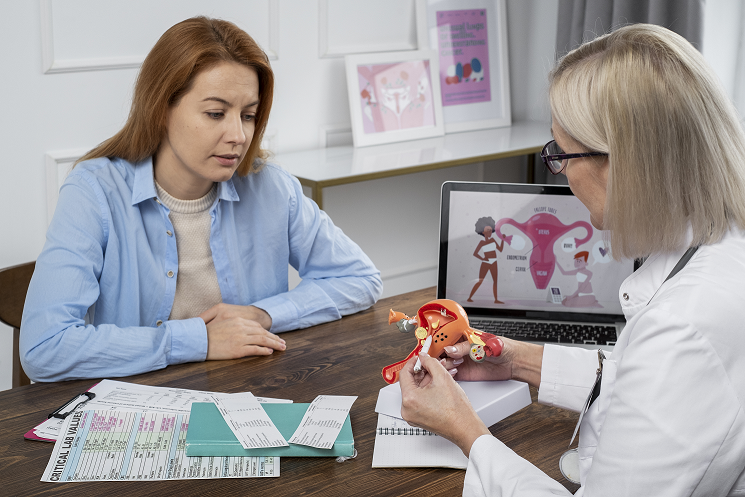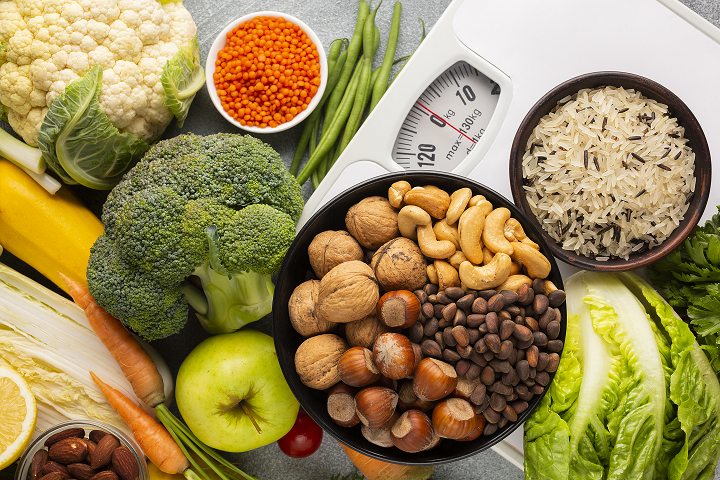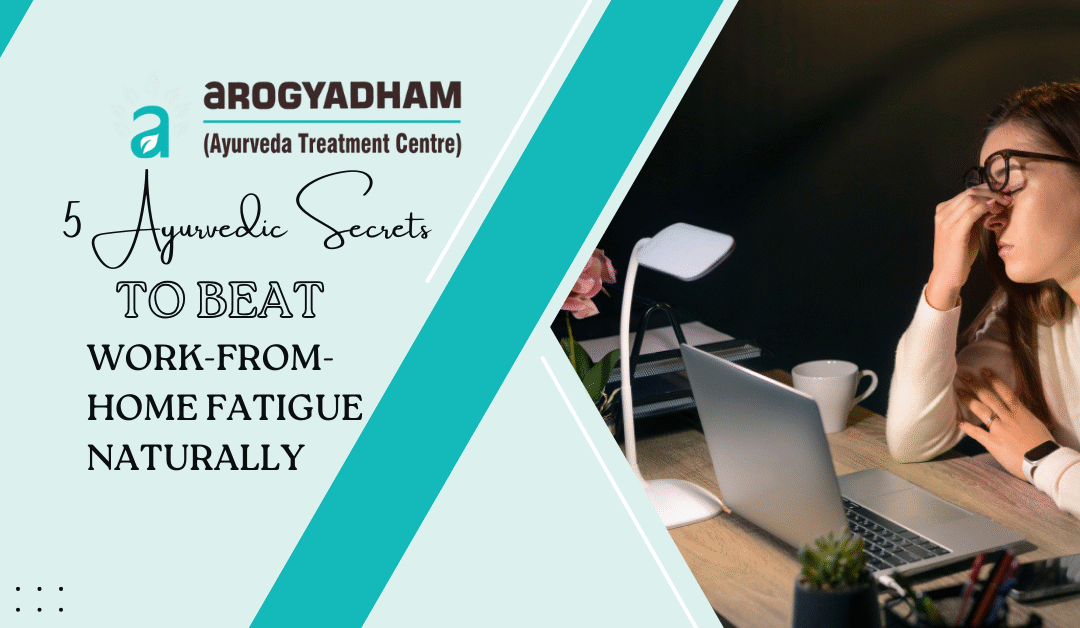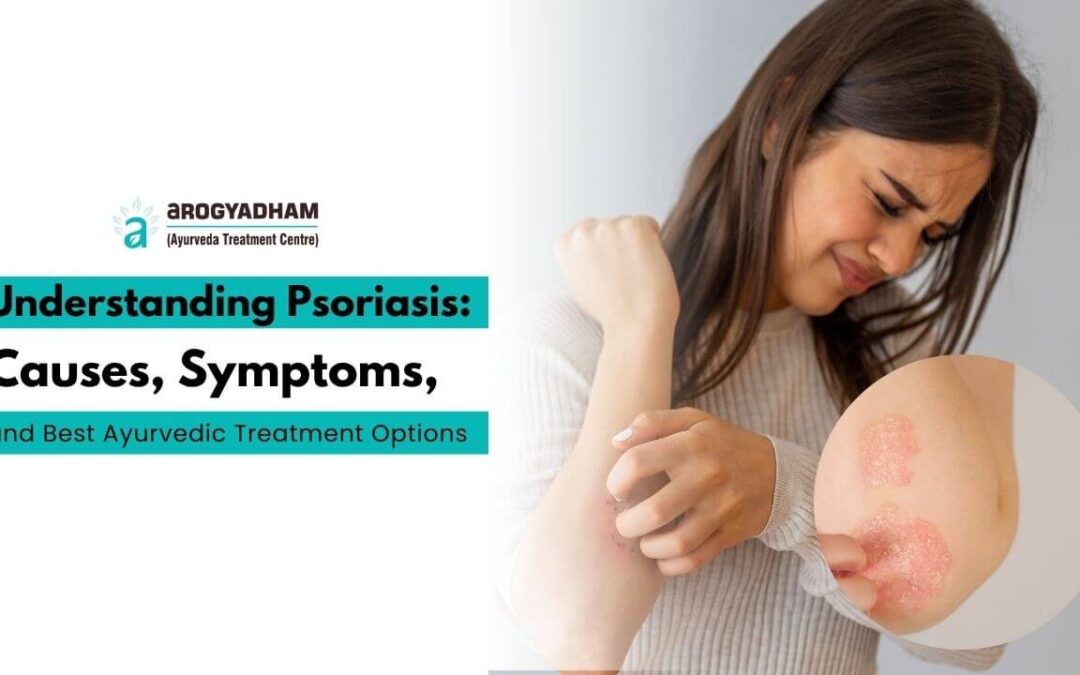PCOS: Causes, Symptoms, And Treatment
- Home
- /
- Treatments
- /
- PCOS: Causes, Symptoms, And...

PCOS is a disorder in which the ovaries produce an abnormally high quantity of androgens, which are male sex hormones, in small amounts in women. The term polycystic ovary syndrome, according to Arogyadham Ayurveda Treatment Centre, refers to the ovaries’ numerous small cysts (fluid-filled sacs). However, some women with this disorder do not develop cysts, whereas others do. The release of a mature egg from an ovary is known as ovulation. It happens so that male sperm can fertilise it. If the egg fails to fertilise, it is excreted during your period.
In some cases, a woman may not produce enough of the hormones required for ovulation. When there is no ovulation, the ovaries can develop many small cysts. Androgens, which are hormones, are produced by these cysts. On the other hand, androgen levels in women with PCOS frequently elevate. It can aggravate a woman’s menstrual cycle issues. Many of the symptoms associated with PCOS can also be caused by it. Arogyadham Ayurveda Treatment Centre, on the other hand, frequently treats PCOS with medication. It does not cure PCOS, but it can help with symptoms and prevent some health problems.
What Exactly Is PCOS?
PCOS, or Polycystic Ovary Syndrome, is a hormonal condition that can occur during the childbearing years. It may impact your ability to have a child (your doctor will call it your fertility).
It could also:
- Stop your periods or make them unpredictable.
- Acne and unwelcome body and facial hair
- Increase your chances of developing other health issues like diabetes and high blood pressure.
On the other hand, treatments are available for the symptoms. You may also be able to get pregnant, though you may need to take fertility medications. Cysts on the ovaries are common in patients. Additionally, that is why it is referred to as “polycystic.” However, the name is deceptive because many people with PCOS do not have cysts.

What Is The Risk Involved During PCOS?
When you have PCOS, you must visit your doctor regularly for checkups. You might be bound to have PCOS if your mom or sister has it. You may likewise be bound to have it, assuming you have insulin resistance or are overweight. You are more likely to experience difficulties as a result of the following:
- High cholesterol can cause heart disease, including high blood pressure and heart attack.
- Insulin opposition, metabolic syndrome, and type 2 diabetes are all factors to consider.
- Obesity
- Obstructive sleep apnea
- Sadness and bipolar problems are instances of temperament issues.
- Endometrial cancer, particularly in older women
What Causes PCOS?
The precise cause remains unknown. Several factors are most likely at work. It can run in families. It is commonly found in sisters, mothers, and daughters. These are some of the causes:
- Insulin Resistance: Insulin resistance is common in women. It means that cells in the body are immune to the effects of normal insulin levels. As a result, more insulin is made to maintain normal blood sugar levels. In addition, because of the increased insulin levels, the ovaries produce excess testosterone.
- Luteinising Hormone (LH): The pituitary gland, located at the bottom of the brain, produces this hormone. It stimulates ovulation and works in tandem with insulin to promote testosterone production. As a result, LH levels elevate in approximately 4 out of 10 PCOS women. A high LH level and high insulin levels indicate that the ovaries produce excessive testosterone.
- Hereditary Factors: PCOS is not usually passed down from parents, but it does run in some families. Sometimes, a hereditary (genetic) factor appears to be involved, but this needs to be fully understood.
- Weight: Obesity or being overweight is not the root cause of PCOS. On the other hand, excess fat can exacerbate insulin resistance if you are chubby or obese. It may cause the insulin level to rise even higher. High insulin levels can contribute to additional weight gain, creating a vicious cycle. Although challenging, losing weight can help break the cycle.
- Excess Androgen: The ovaries can produce many androgens when you have PCOS. On the other hand, ovulation hampers an excess of androgen. It means that eggs aren’t produced regularly and aren’t released from the follicles where they grow. Androgen excess can also lead to hirsutism and acne.

Also read : Causes Of Infertility In Women: Psychological Factors
Symptoms Of PCOS
PCOS symptoms frequently appear during the first menstrual period. Additionally, symptoms may occur after you’ve had periods for a while. On the other hand, obese people typically have more severe PCOS signs and symptoms. PCOS symptoms differ. When you have at least two of these symptoms, you have this syndrome.
- Irregular Periods: PCOS is commonly characterised as irregular or infrequent menstrual cycles. However, periods that last several days or longer than usual are also unusual. For instance, you may have at most nine periods per year. Those periods can happen up to 35 days apart. As a result, you might have difficulty getting pregnant.
- Too much Androgen: Excessive facial and body hair may result from high levels of the hormone androgen. It is known as hirsutism. Severe acne and male-pattern baldness can also occur.
- Polycystic Ovaries: Perhaps your ovaries are larger. There may be many follicles with immature eggs developing on the ovary’s edge. It is possible that the ovaries don’t function properly.
- Fertility Problems: Fertility issues require ovulation to become pregnant. Moreover, you might not ovulate every month, and some women do not. Therefore, PCOS is one of the most common reasons for the inability to conceive (infertility).
- Excess Hair Growth (Hirsutism): It affects more than half of all PCOS women. It primarily affects the face, lower tummy (abdomen), and chest. In other words, it is typically male-pattern hair. It does not happen to all PCOS women.
Treatment of PCOS
A variety of factors influence PCOS Treatment. For example, your age, the severity of your symptoms, and overall health could all be factors. On the other hand, the type of treatment you receive may also determine your desire to become pregnant.
If you decide to have a child, your treatment may include the following:
- A Change In Diet And Activity: A healthy diet and increased physical activity can help you lose weight and alleviate symptoms. They can likewise assist your body in utilising insulin more effectively, lower blood glucose levels, and potentially assist you with ovulating.
- Medications to Cause Ovulation: Medications can help the ovaries produce eggs, typically. However, these drugs are not without risks. They can increase the likelihood of having more than one child (twins or more). Moreover, they may also cause ovarian hyperstimulation. It happens when the ovaries produce an abnormally large amount of hormones. It can cause side effects like stomach bulging and pelvic pain.
If you do not intend to become pregnant, you may receive the following treatment:
- Birth Control Pills: These help with menstrual cycle control, androgen reduction, and acne reduction.
- Diabetes Medication: It is frequently used to treat insulin resistance in PCOS. In addition, it can assist with lessening androgen levels, slowing hair development, and increment ovulation frequency.
- Medications To Treat Other Symptoms: A few drugs can assist with decreasing hair growth or skin inflammation.
- A Change in Diet and Activity: A healthy diet and increased physical activity can help you lose weight and alleviate symptoms. In addition, they can assist your body with utilising insulin more effectively, lower blood glucose levels, and potentially help you with ovulating.
Also read : Menopause Treatment In Ayurveda: The Ultimate Guide

The Final Word
PCOS can disrupt a woman’s menstrual cycle and make it difficult to conceive. High levels of male hormones can also cause unwanted symptoms such as facial and body hair growth. Lifestyle interventions, according to Arogyadham Ayurveda Treatment Centre, are the first treatments doctors recommend for PCOS, and they frequently work well.
On the other hand, weight loss can help treat PCOS symptoms and increase your chances of getting pregnant. Diet and aerobic exercise are two effective weight loss methods. If lifestyle changes do not work, medications are an option. Birth control pills and metformin, according to Arogyadham Ayurveda Treatment Centre, can restore more regular menstrual cycles and relieve PCOS symptoms.
Identifying the causes is important to address Female Sexual Problems as well as Peyronie’s disease. Hormonal imbalance gives rise to numerous problems, but early detection and effective management can improve an individual’s standard of living. It is important to get medical advice for personal treatment and better health prospects.
Call: +91-7300783206
Mail: info@arogyadham.in






